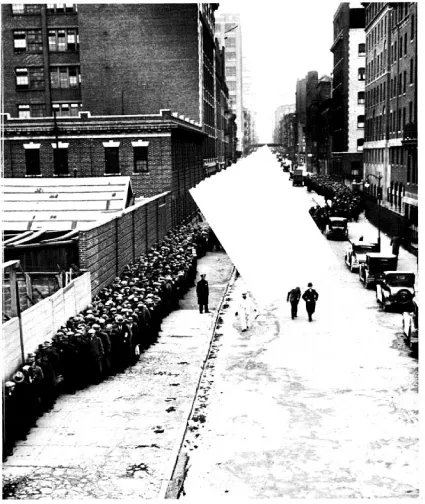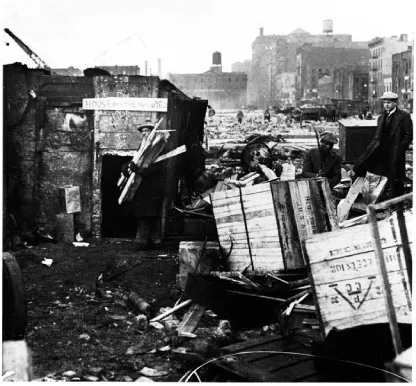![]()
Part I
The Early Depression
E. J. Sullivan, “The 1932nd Psalm”
![]()
Chapter 1. Reactions to Hoover and Economic Breakdown
We have done all we can do; There is nothing more to be done.
Herbert Hoover, 4 March 1933.
The letters contained in this chapter were addressed to Herbert Hoover’s special committees set up to deal with the economic crisis, the President’s Emergency Committee on Employment (PECE) and the President’s Organization for Unemployment Relief (POUR). Unlike his successor, Hoover never managed to establish rapport with working-class Americans. Victims of the Depression rarely looked to him as a father figure. Accordingly, this chapter has a larger number of communications from relatively well-to-do citizens than will most of the later chapters. These are included to show the attitudes of some of those who remained basically unscathed by the Depression. Many such fortunate people continued to believe in the early thirties that those who failed must be lazy, incompetent, or stupid.
Patience remained a cardinal virtue for many in the early years of the Depression. Things would get better if everyone would remain calm, some of the well-to-do implied. Some suggested that “depressing statements” about unemployment and hunger should not be broadcast. Although President Hoover could not keep depressing stories off the radio waves, he did his part to hide the bad news by refusing to allow official unemployment statistics to be collected.
Those hard hit by the Depression could not ignore it. Some pointed to what they saw as the causes of economic collapse but continued to support Hoover. Others were less generous in their views of the president and his class. The last several letters in this chapter are examples of differing degrees of worker discontent in the Hoover years. Some of them appear to have been inspired by leftist organizations, but others are plainly the spontaneous expressions of “ordinary” workers who had become disillusioned with the economic system and the captains of industry at its helm.
One thing that is striking about all of the letters to the Hoover administration is the lack of warmth or affection for the president. Even those who supported Hoover seem to have admired, rather than loved, him. Others had, understandably, concluded that “Engineers may be intelligent but poor Presidents.” Feelings toward Franklin D. Roosevelt, as later letters unmistakably show, were completely different.
1. The American people are wonderful!
Fremont, O.
Dec. 21 - 1930.
President Hoover
White House
Washington, D.C.
Hon. Sir–
I am fifty years old. For many years I have been a house-to-house canvaser, Through good times and bad. After Canvasing Akron, Ohio, Canton, Ohio and Fremont, Ohio, as well as Detroit, Mich, I say The American People are wonderful!
During the past 9 months I have encountered poverty, worry and patience. The people endure hard times without evidence of rancor or disloyalty. Many men try daily for employment. The hard times have served to emphasize the loyalty, the patience, the Stoic-like qualities of American citizenry. I wish they could get employment. Their wives and children pray for it. Justice cries for it. The Heart of Humanity must heed.
Sincerely,
L. J. B. [male]
2. There is not five per cent of the poverty, distress, and general unemployment that many of your enemies would have us believe
Contractor and Builder Real Estate Insurance Mortgages
W. H. H.
Annapolis, Maryland
September 10, 1931
President Herbert Hoover
Washington, D.C.
My dear Mr. Hoover,
It is my purpose to write you a short letter and to cheer you along with your trying undertakings. During the war I had a brief interview with you when I was fuel administrator at Annapolis, and although I well remember you, yet it may be that I am not even a memory to you. However, I was so favorably impressed that I worked for you when you were elected President, although I appear to have been born a democrat.
In these days of unrest and general dissatisfaction it is absolutely impossible for a man in your position to get a clear and impartial view of the general conditions of things in America today. But, of this fact I am very positive, that there is not five per cent of the poverty, distress, and general unemployment that many of your enemies would have us believe. It is true, that there is much unrest, but this unrest is largely caused,—by the excessive prosperity and general debauchery through which the country has traveled since the period of the war. The result being that in three cases out of four, the unemployed is looking for a very light job at a very heavy pay, and with the privilege of being provided with an automobile if he is required to walk more than four or five blocks a day.
National Relief Director, Walter S. Gifford, and his committee are entirely unnecessary at this time, as it has a tendency to cause communities to neglect any temporary relief to any of their people, with the thought of passing the burden on to the National Committee. I am also of opinion that the suggested five billion dollar loan, that the Hearst papers have been agitating, is an impractical, foolish and unnecessary burden and obligation that they would place upon the shoulders of future posterity to pay off.
One of the days, when I am in Washington, I shall hope to greet you in person for two or three minutes, and during the interval believe me to be one of your well wishers in this ocean of conflict.
Yours Sincerely,
W. H. H. [male]
3. President Hoover is not responsible for any of our problems
J. W. B.
Minneapolis
November 9, 1931
Hon. Walter Newtona
White House,
Washington, D.C.
My dear Mr. Newton:
I listened to the President’s Relief Program for more than an hour last night. It was a good program.
The Sunday papers were full of encouraging information about almost every line of activity. The advance in wheat was particularly stressed, as was the advance in the price of silver. Stocks and bonds, both foreign and domestic, were shown as having enjoyed very substantial advance over the quoted prices of the week previous. Sunday’s papers made in the main pleasant reading.
In the evening, the radio programs brought out a lot of most depressing statements.
If the information contained in the papers is true, and I believe it is, as most statements are supported by statistical records, it seems to me we are not justified in broadcasting statements to the effect that six million or more people of the United States are actually starving or will starve before the winter is over, unless those who have contribute generously to the needs of those who have not.
I am not opposed to contributions for the benefit of those in need. My thought is that the President has been doing everything humanly possible to promote right thinking by the minds of the American people. The broadcasting of such a program as we listened to last night, cannot help but have a depressing effect, or of offsetting some of the things which we claim we have accomplished.
The organization responsible for the President’s Relief Program is not soliciting funds. A great many of the campaigns for funds in the larger centers have been completed or will be before the end of the present week.
I was impressed last night with the fact that all reference to unemployment emphasized the suffering and deprivations we might expect to experience during the winter months. If conditions are improving, would it not be well, if these programs are to be continued, to have at least a number of the people on the program speak of the improvement that has been made, the improvement that is being made, and leaving to others the responsibility of telling of the depression that still exists in certain industries and in certain sections of the country?
If the employers of labor throughout the country would reduce the standard day’s work, temporarily at least, twenty-five percent, thereby providing work for those who are at present unemployed, the necessity of providing for the maintenance of additional soup houses and shelter would be eliminated.
I am not unmindful of the problems President Hoover has been called upon to solve. They are not only national, but international. He has been criticised by many—men in high places and men in low places. I have failed to see where any of them have offered a constructive solution of any of the problems that confront us.
President Hoover is not responsible for any of our problems. Criticism comes largely from those who are responsible; and his critics will be the first to try to take the credit unto themselves as soon as we get out of our present predicament.
This letter comes from a Democrat who usually votes the Republican ticket, and it may or may not be of interest to you. However that may be, I am, with best regards,
Very truly yours,
J. B. [male]
4. They do not need men to work any more
Amarillo
Texas
November 1930
Colonel Arthur Woods
Chirman U.S. Comm.
Dear sir:
I thought I would write and ask you if the Government can advise a person of some new foreign country or Some big Island away out in the ocean where a fellow can go and build up a home.
This United States is getting or has got to many poor laboring people in it, for the good of everybody and from now now on the schools and Colleges in these United States will be turning loose on a Glutted labor market about Fifteen milion more young common labor Pick and shovle men besides they do not need men to work any more they have machinery to do the heavy work that is fine if we could find Something else to do, but there is nothing else to do a man can not work for less than fifty cents per hour Eight hours per day and pay for his room and board.
You may say it does not cost a man four dollars a day but you must under stand there is a Sunday in each week and a lot of hollodays. that a company will not let a man work.
We have an awful fine Government in this U.S. if we can keep good honest men at the head of it. but dishonest in the men at the head of this government would ruin it in a very short time.
The President of this U.S. has a big job and I am for President Hoover reguardless.
Yours truly,
G. B. [male]
5. The rich dont care so long as they have full and plenty
[Pottstown, Pa.]
October 30, 1930
[President Herbert Hoover
The White House
Washington, D.C.]
Dear Sir:
I am persuaded to write you, concerning aid to unemployment. I hope this movement will be speeded up so people in Pottstown will feel and know the results before Cold weather comes upon us, the struggling starving working class under nourished Men. women, and children. It really is alarming that this so called prosperous Nation that we must suffer on acct of a few men seeking power and rule and have laws pass to suit themselves. … I am one of the men out of work but the rich dont care so long as they have full and plenty. …
I hope relief will be coming soon and some action not Just paper talk. Oh the People have been so much belied that you cannot ...


